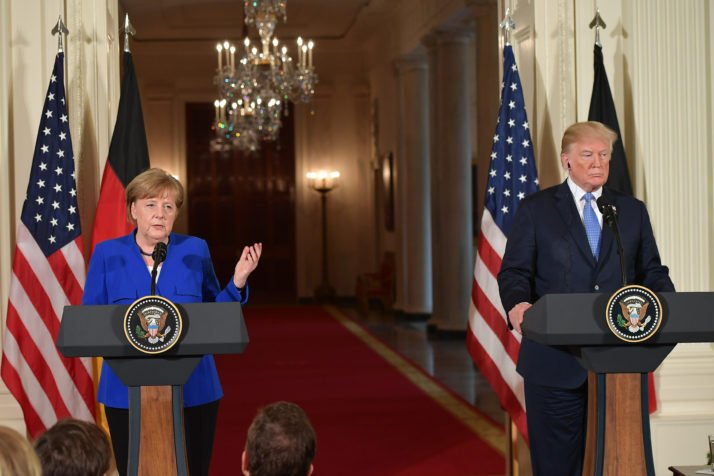
Angela Merkel arrived at the White House Friday hoping to resuscitate the transatlantic relationship and convince Donald Trump to back away from his belligerent positions on trade and Iran.
She left with little more than a comeuppance.“We need a reciprocal relationship,” Trump said in Merkel’s direction at a joint press conference after their afternoon meeting, highlighting the more than $150 billion trade deficit the U.S. has with the EU.
From there, the president pivoted to defense spending, another of his longstanding grievances with Germany and other European allies, whom he accuses of not paying their fair share.
“NATO is wonderful but it helps Europe more than us so why are we paying the biggest share?” Trump asked.
Though Trump has often made such arguments, to do so alongside a foreign guest of Merkel’s stature amounted to nothing short of a diplomatic affront.
Trump insisted he and the German chancellor “have a great relationship,” but their body language suggested otherwise.
Merkel, who is used to being the most powerful person in the room, stood stonefaced next to Trump in the East Room, looking away as he spoke, pursing her lips.
Her attempt to win him over in her opening remarks with lavish praise for the friendship the U.S. had shown Germany over the decades — at one point even adopting a Trumpism to call the U.S. a “tremendous country” — appeared to have had little impact.
Asked if she’d succeeded in convincing Trump to cancel planned steel and aluminum tariffs on Europe, Merkel offered a curt response: “The president will decide. That is very clear.”
Her answer betrayed the extent to which Germany, and by extension Europe, is at Trump’s mercy. The proposed tariffs would hit Germany’s auto industry. Many fear the moves could lead to a more serious trade conflict between the U.S. and Europe.
Merkel’s visit with Trump, which lasted only a few hours including lunch, followed French President Emmanuel Macron’s state visit to Washington this week. And though the chemistry between Macron and Trump was far better, the French president also failed to convince the American president to change course on the planned tariffs, which are set to take effect May 1.
Taken together, the European leaders’ meetings with Trump suggested that on issues of substance, the transatlantic relationship remains as troubled as ever.“Trump is treating Europeans with condescendence and is unwilling to see relationship in terms of respectful partnership or alliance,” Ulrich Speck, a German political analyst with the Aspen Institute, wrote after Merkel’s encounter with Trump. “He looks at them as bothersome clients, as a burden, not an asset.”
Merkel’s meeting with Trump, her second trip to the White House since he took office, put the transatlantic power dynamic in stark relief.
The German leader was clearly on the defensive, insisting repeatedly that Germany was committed to fulfilling its obligations within NATO, despite falling well short of the alliance’s spending targets.
“Germany is and will remain a reliable NATO partner,” she said.
On the question of the future of Western powers’ agreement with Iran over its nuclear program, which Trump has threatened to withdraw from, Merkel showed a newfound willingness to revisit the issue.
“The agreement is a first step … but is not enough,” said Merkel, who has previously vigorously defended the pact.
After Trump’s election, some commentators described Merkel as the last beacon of the liberal Western order. At the press conference, however, the German leader sounded almost desperate to get on his good side.
“We need to learn to play our role as a large, economically successful country,” she said, adding that “the president also says that we [Germans] are economically successful but don’t want to engage as much militarily and politically.”
Trump responded by saying that the relationship between U.S. and Europe had “tremendous potential,” but had to be fair.
After the speaking to the press for about 20 minutes, Trump ended the news conference abruptly.
“Great job, thank you,” he said to Merkel, as he ushered her away from the microphones.